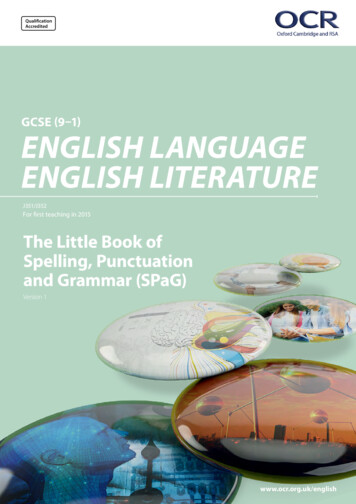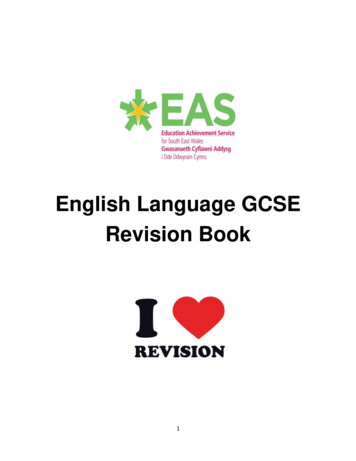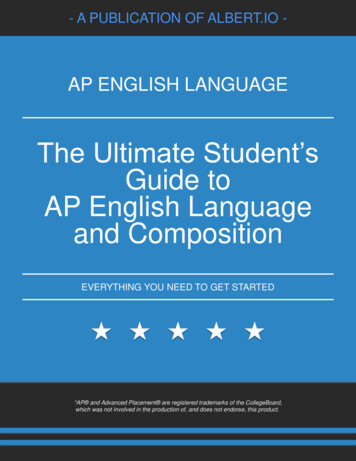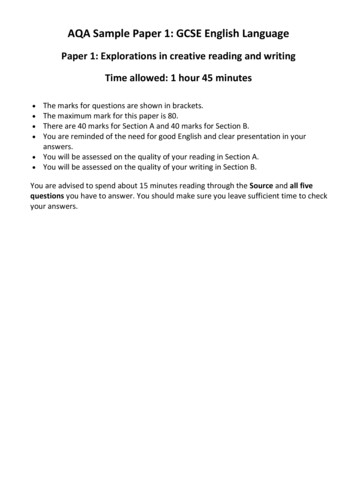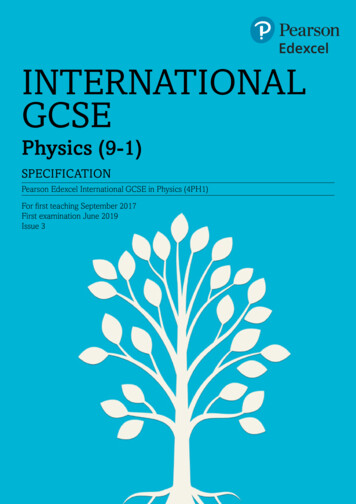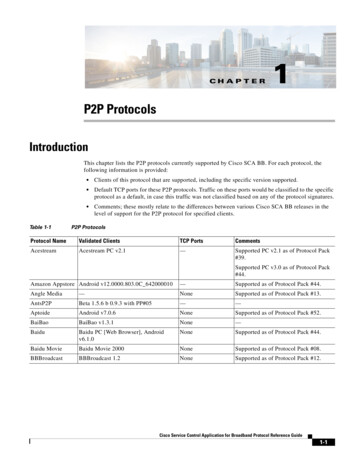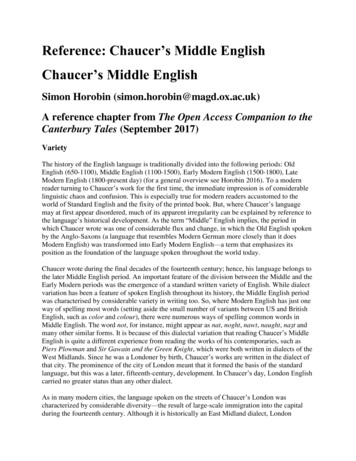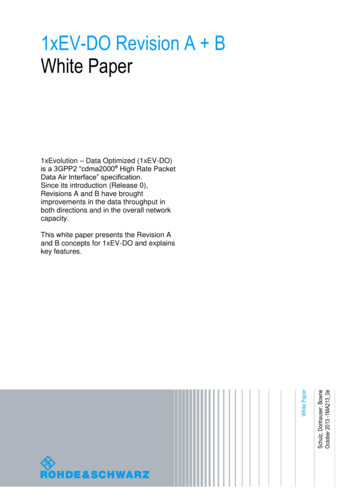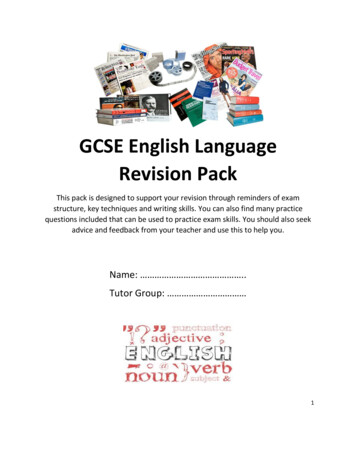
Transcription
GCSE English LanguageRevision PackThis pack is designed to support your revision through reminders of examstructure, key techniques and writing skills. You can also find many practicequestions included that can be used to practice exam skills. You should also seekadvice and feedback from your teacher and use this to help you.Name: .Tutor Group: 1
Contents pageEnglish Language Paper 1The Structure of English Language Paper 1 3Language Techniques Revision 4Structural Techniques Revision 5Narration – Who’s telling the story and how 6-8Approaching the Questions .9Exam Questions on Lord of the Flies Extract .10-11Advice and Model answers for the Structure Question 12Exam Questions on Pride and Prejudice Extract .13-15Exam Questions on Ministry of Fear Extract .16-18Exam Questions on Children of Men Extract .19-21Reading Challenge Tasks .21Section B: Writing –Reflecting on your skills and useful websites for revision. .22Section B Exam Questions 23-24Writing Challenge Tasks .25-29English Language Paper 2The Structure of English Language Paper 2 30Approaching the Questions 31-33Texts, Advice & Activities to practise comparing . 34-41Spelling, Punctuation and Grammar .42-60Definitions of Punctuation Marks .62-63Definitions of Word Types .64-662
The structure of the English Language Paper 1 (1 hour, 45 mins)Section A: Reading - four questions based on one fiction literary extract (40marks)Spend no more than one hour Question 1: Comprehension question (4 marks)You will have to pick out four pieces of information from the text. Question 2: Language question (8 marks)You will have to analyse the language in a section of the extract. Question 3: Structure question (8 marks)You will have to analyse the writer’s structural choices in whole of the extract. Question 4: Personal Response (20 marks)You explain to what extent you agree with someone’s opinion on the text and support it withlots of language and structure analysis.Section B: Writing – Write creatively (40marks)Spend 45 minutes There will be two questions and you choose one. You should write creatively.There are 24 marks available for content and organization of your writing.There are 16 marks available for vocabulary, spelling, punctuation and grammar.Set targets for yourself based on your teacher’s feedback:1.2.3.4.5.3
Language Techniques RevisionIn the reading section of English Language Paper 1, you will have an extract from a novel and have toanswer four questions: comprehension;analysing the writer’s choice of language;analysing the writer’s choice of structure;presenting a personal response to the extract.You must learn to identify language and structure techniques and practice answering questions.Below you will find a list of language and structural techniques and on the following page you will findan example exam question. You might find it good revision to define these features, and remember, thelists are not exhaustive!Language FeaturesFeatureVerbDefinitionNounProper nounConcrete nounAbstract mbolism4
Structural Techniques eshadowingJuxtaposition/ContrastChronological orderFlashbackReasons forending/startingparagraphsRepetitionSentence LengthOpeningsClosingsNarrative voiceNarrative Tense5
Narration – Who’s telling the story and how .?Narrative Point of viewFirst Person:The story is revealed through a narrator who is alsoa character within the story, so that the narratorreveals the plot by referring to this viewpointcharacter with forms of "I" or, when plural, "we".Second Person:The narrator refers to him or herself as 'you' in away that suggests alienation from the eventsdescribed, or emotional/ironic distance. This is lesscommon in fiction.Third Person:Third-person narration provides the greatestflexibility to the author and thus is the mostcommonly used narrative mode in literature. Inthe third-person narrative mode, each and everycharacter is referred to by the narrator as "he","she", "it", or "they” or the characters’ names. Inthird-person narrative, it is clear that the narratoris an unspecified entity or uninvolved person whoconveys the story and is not a character of any kindwithin the story.Alternating or shifting perspectives:Some stories may be a combination of first,second, and/or third person views. This may beused where the writer wishes to add their ownobservations to the events that take place duringNarrative VoiceStream of consciousness voice:Gives the (typically first-person) narrator'sperspective by attempting to replicate thethought processes—as opposed to simply theactions and spoken words—of the narrativecharacter. Often, interior monologues andinner desires or motivations, as well as piecesof incomplete thoughts, are expressed to theaudience but not necessarily to othercharactersCharacter Voice:One of the most common narrative voices,used especially with first- and third-personviewpoints, is the character voice, in which aconscious "person" (in most cases, a livinghuman being) is presented as the narrator. Inthis situation, the narrator is no longer anunspecified entity; rather, the narrator is amore relatable, realistic character who mayor may not be involved in the actions of thestory and who may or may not take a biasedapproach in the storytelling. If the character isdirectly involved in the plot, this narrator isalso called the viewpoint character. Theviewpoint character is not necessarily thefocal character.**It can be split between the child and adultperspective of the same characterUnreliable narrator:Under the character voice is the unreliablenarrative voice, which involves the use of adubious or untrustworthy narrator. Thismode may be employed to give the audiencea deliberate sense of disbelief in the story ora level of suspicion or mystery as to whatinformation is meant to be true and what isto be false.Narrative TimePast Tense:The events of the plot are depicted asoccurring sometime before the currentmoment (in the past).Present tense:The events of the plot are depicted asoccurring now — at the current moment— in real time. In English, this tense,known as the "historical present", is morecommon in spontaneous conversationalnarratives than in written literature. Arecent example of this is the HungerGames trilogy by Suzanne Collins.Future tense:Rare in literature, this tense portraysthe events of the plot as occurring sometime in the future. Often, theseupcoming events are described suchthat the narrator has foreknowledge (orsupposed foreknowledge) of the future.Omniscient narrator:When the narrator is all seeing and allknowing and knows the thoughts and feelingsof all characters. This is often in the thirdperson as the narrator knows all the6
the story notwithstanding whether or not theywere a participant in those events.thoughts, feelings and actions of all thecharactersLimited Omniscient Narrator:In limited omniscient point of view, a narratorhas limited knowledge of just one character,leaving other major or minor characters.What effect is achieved through each style of narration?Read the extracts and work out what tense, narrative point of view and perspective has been used. Annotate themto consider the effect on the reader. What do we understand about each character, their world and their identitybecause of the narrative choices?1984 by George Orwell:It was nearly eleven hundred, and in the Records Department, where Winston worked, they were dragging thechairs out of the cubicles and grouping them in the centre of the hall, opposite the big telescreen, in preparationfor the Two Minutes Hate. Winston was just taking his place in one of the middle rows when two people whom heknew by sight, but had never spoken to, came unexpectedly into the room. One of them was a girl whom he oftenpassed in the corridors. He did not know her name, but he knew that she worked in the Fiction Department.Presumably – since he had sometimes seen her with oily hands and carrying a spanner – she had some mechanicaljob on one of the novel-writing machines. She was a bold-looking girl, of about twenty-seven, with thick dark hair,a freckled face and swift, athletic movements. A narrow scarlet sash, emblem of the Junior Anti-Sex League, waswound several times round the waist of her overalls, just tightly enough to bring out the shapeliness of her hips.Winston had disliked her from the very first moment of seeing her. He knew the reason. It was because of theatmosphere of hockey-fields and cold baths and community hikes and general clean-mindedness which shemanaged to carry about with her. He disliked nearly all women, and especially the young and pretty ones. It wasalways the women, and above all the young ones, who were the most bigoted adherents of the Party, theswallowers of slogans, the amateur spies and nosers-out of unorthodoxy. But this particular girl gave him theimpression of being more dangerous than most. Once when they passed in the corridor she had given him a quicksidelong glance which seemed to pierce right into him and for a moment had filled him with black terror. The ideahad even crossed his mind that she might be an agent of the Thought Police. That, it was true, was very unlikely.Still, he continued to feel a peculiar uneasiness, which had fear mixed up in it as well as hostility, whenever shewas anywhere near him.Jane Eyre by Charlotte Bronte:All John Reed's violent tyrannies, all his sisters' proud indifference, all his mother's aversion, all the servants'partiality, turned up in my disturbed mind like a dark deposit in a turbid well. Why was I always suffering, alwaysbrowbeaten, always accused, for ever condemned? Why could I never please? Why was it useless to try to win anyone's favour? Eliza, who was headstrong and selfish, was respected. Georgiana, who had a spoiled temper, a veryacrid spite, a captious and insolent carriage, was universally indulged. Her beauty, her pink cheeks and goldencurls, seemed to give delight to all who looked at her, and to purchase indemnity for every fault. John no onethwarted, much less punished; though he twisted the necks of the pigeons, killed the little pea-chicks, set the dogsat the sheep, stripped the hothouse vines of their fruit, and broke the buds off the choicest plants in theconservatory: he called his mother "old girl," too; sometimes reviled her for her dark skin, similar to his own;bluntly disregarded her wishes; not unfrequently tore and spoiled her silk attire; and he was still "her own darling."7
I dared commit no fault: I strove to fulfil every duty; and I was termed naughty and tiresome, sullen and sneaking,from morning to noon, and from noon to night. [ ]What a consternation of soul was mine that dreary afternoon! How all my brain was in tumult, and all my heartin insurrection! Yet in what darkness, what dense ignorance, was the mental battle fought! I could not answer theceaseless inward question — why I thus suffered; now, at the distance of — I will not say how many years, I see itclearly.The Handmaid’s Tale:Love? said the Commander.That’s better. That’s something I know about. We can talk about that.Falling in love, I said. Falling into it, we all did then, one way or another. How could he have made such light ofit? Sneered even. As if it was trivial for us, a frill, a whim. It was, on the contrary, heavy going. It was the centralthing; it was the way you understood yourself; if it never happened to you, not ever, you would be like a mutant, acreature from outer space. Everyone knew that.Falling in love, we said; I fell for him. We were falling women. We believed in it, this downward motion: solovely, like flying, and yet at the same time so dire, so extreme, so unlikely. God is love, they once said, but wereversed that, and love, like heaven, was always just around the corner. The more difficult it was to love theparticular man beside us, the more we believed in Love, abstract and total. We were waiting, always, for theincarnation. That word, made flesh.Answers:1984: Third person, Limited omniscient narrator, past tenseJane Eyre: first person, character voice, split between adult and child perspective, past tenseThe Handmaid’s Tale: first person, character voice, stream of consciousness, past tense8
Approaching the questionsYou will NOT be told when to move onto the next question. Therefore, YOU must carefully monitor your time and ensure you stick to the timingssuggested by your teacher.Question 1 Pick-out key information. Ensure you check where in the source the examiner wants you to lift information from. Always write a full sentence for each answer.Question 2 Discuss and analyse the writer's choice of language. The extract is printed in the answer booklet for you to use. IDENTIFY LITERARY techniques for every quotation you use. Discuss the effect the choice of words has on the reader.USE A MINIMUMof 6 QUOTES.If you’re aimingfor a Grade 6 orabove: 8 – 10 quotesis advisable.Question 3How has the writer structured the text to interest you as a reader? This question will always ask you to discuss the WHOLE of the extract. You MUST! IDENTIFY STRUCTURAL techniques and use evidence from the text. Discuss the EFFECT the choice of structural techniques has on the reader.Question 4:TO WHAT EXTENT DO YOU AGREE WITH SOMEONE’S OPINION? This question will always ask you to discuss PART of the extract. You MUST! THIS QUESTION IS WORTH 20 MARKS- LEAVE PLENTY OF TIME TO ANSWER IT! Support your opinions with NUMEROUS QUOTATIONS and TECHNIQUES IDENTIFIED. Discuss and evaluate the EFFECT the choice of the writer’s language and structuraltechniques in your chosen quotations.9
This extract is taken from ‘Lord of the Flies’ by William GoldingThe boys think a beast is coming to attack them and this is their response.Jack leapt on to the sand."Do our dance! Come on! Dance!"He ran stumbling through the thick sand to the open space of rock beyond the fire. Between theflashes of lightning the air was dark and terrible; and the boys followed him, clamorously. Roger becamethe pig, grunting and charging at Jack, who side-stepped. The hunters took their spears, the cooks tookspits, and the rest clubs of firewood. A circling movement developed and a chant. While Roger mimedthe terror of the pig, the littluns ran and jumped on the outside of the circle. Piggy and Ralph, under thethreat of the sky, found themselves eager to take a place in this demented but partly secure society.They were glad to touch the brown backs of the fence that hemmed in the terror and made itgovernable." Kill the beast! Cut his throat! Spill his blood! "The movement became regular while the chant lost its first superficial excitement and began to beatlike a steady pulse. Roger ceased to be a pig and became a hunter, so that the center of the ring yawnedemptily. Some of the littluns started a ring on their own; and the complementary circles went round andround as though repetition would achieve safety of itself. There was the throb and stamp of a singleorganism.The dark sky was shattered by a blue-white scar. An instant later the noise was on them like the blowof a gigantic whip. The chant rose a tone in agony." Kill the beast! Cut his throat! Spill his blood! "Now out of the terror rose another desire, thick, urgent, blind." Kill the beast! Cut his throat! Spill his blood! "Again the blue-white scar jagged above them and the sulphurous explosion beat down. The littlunsscreamed and blundered about, fleeing from the edge of the forest, and one of them broke the ring ofbiguns in his terror."Him! Him!"The circle became a horseshoe. A thing was crawling out of the forest. It came darkly, uncertainly.The shrill screaming that rose before the beast was like a pain. The beast stumbled into the horseshoe." Kill the beast! Cut his throat! Spill his blood! "The blue-white scar was constant, the noise unendurable. Simon was crying out something about adead man on a hill." Kill the beast! Cut his throat! Spill his blood! Do him in! "The sticks fell and the mouth of the new circle crunched and screamed. The beast was on its knees inthe center, its arms folded over its face. It was crying out against the abominable noise something abouta body on the hill. The beast struggled forward, broke the ring and fell over the steep edge of the rock tothe sand by the water. At once the crowd surged after it, poured down the rock, leapt on to the beast,screamed, struck, bit, tore. There were no words, and no movements but the tearing of teeth and claws.Then the clouds opened and let down the rain like a waterfall. The water bounded from themountain-top, tore leaves and branches from the trees, poured like a cold shower over the struggling10
heap on the sand. Presently the heap broke up and figures staggered away. Only the beast lay still, a fewyards from the sea. Even in the rain they could see how small a beast it was; and already its blood wasstaining the sand.Exam questions for Lord of the Flies Extract01 Re-read the first part of the extract, lines 1-10.List four things from this part of the extract about the setting.[4 marks]02 Look in detail at the first part of the extract.How does the writer use language here to create tension? You could write about:Words and phrases.Language features and techniques.Sentence forms.[8 marks]03 You now need to think about the whole of the extract.How has the writer structured the text to interest you as a reader?You could write about: What the writer focuses your attention on at the beginning.How and why the writer changes this focus as the extract develops.Any other structural features that interest you.[8 marks]04A student, having read the extract commented: “This extract really shows how cruel people cantruly be.”To what extent do you agree?In your response, you could: Consider your own impressions of how violence is represented.Evaluate how the writer describes the boys. Support your opinions with quotations from the text.[20 marks]11
Some advice and model answers for the structure questionEnsure you’re able to zoom in on the techniques, but explain how it affects the text as a whole.Going from descriptive to analyticalZoom inand thenZOOMOUT!Moving from WHAT to WHYIncreasing sophisticationCompare these example paragraphs and give each one a www and and EBI.Golding makes a very tense scene that is quite frightening. This is because of the repetition of“Kill the beast!”. It is also a short sentence and an exclamation to make the reader feelinvolved in the scene. This has a strong effect on the reader because they are shocked andhorrified by what happens.Golding has made us feel exhilarated but sickened in this description of a brutal mob murder.The repetitive chanting of “Kill the beast!” throughout the passage builds the momentum of thewhole scene towards its grisly and gruesome conclusion. The senselessness of this killingreminds us of how easily violence, madness and cruelty can drive humans to commit terribleacts.Compare these paragraphs to your own.12
This extract is taken from ‘Pride and Prejudice’ by Jane AustenElizabeth Bennett is visiting a stately home with her aunt; they are riding in a carriage andapproaching the house.Elizabeth, as they drove along, watched for the first appearance of Pemberley Woods with someperturbation; and when at length they turned in at the lodge, her spirits were in a high flutter.The park was very large, and contained great variety of ground. They entered it in one of itslowest points, and drove for some time through a beautiful wood stretching over a wide extent.Elizabeth's mind was too full for conversation, but she saw and admired every remarkable spotand point of view. They gradually ascended for half-a-mile, and then found themselves at the topof a considerable eminence, where the wood ceased, and the eye was instantly caught byPemberley House, situated on the opposite side of a valley, into which the road with someabruptness wound. It was a large, handsome stone building, standing well on rising ground, andbacked by a ridge of high woody hills; and in front, a stream of some natural importance wasswelled into greater, but without any artificial appearance. Its banks were neither formal nor falselyadorned. Elizabeth was delighted. She had never seen a place for which nature had done more, orwhere natural beauty had been so little counteracted by an awkward taste. They were all of themwarm in their admiration; and at that moment she felt that to be mistress of Pemberley might besomething!They descended the hill, crossed the bridge, and drove to the door; and, while examining thenearer aspect of the house, all her apprehension of meeting its owner returned. She dreaded lestthe chambermaid had been mistaken. On applying to see the place, they were admitted into thehall; and Elizabeth, as they waited for the housekeeper, had leisure to wonder at her being whereshe was.The housekeeper came; a respectable-looking elderly woman, much less fine, and more civil,than she had any notion of finding her. They followed her into the dining-parlour. It was a large,well proportioned room, handsomely fitted up. Elizabeth, after slightly surveying it, went to awindow to enjoy its prospect. The hill, crowned with wood, which they had descended, receivingincreased abruptness from the distance, was a beautiful object. Every disposition of the groundwas good; and she looked on the whole scene, the river, the trees scattered on its banks and thewinding of the valley, as far as she could trace it, with delight. As they passed into other roomsthese objects were taking different positions; but from every window there were beauties to beseen. The rooms were lofty and handsome, and their furniture suitable to the fortune of itsproprietor; but Elizabeth saw, with admiration of his taste, that it was neither gaudy nor uselesslyfine; with less of splendour, and more real elegance, than the furniture of Rosings."And of this place," thought she, "I might have been mistress! With these rooms I might nowhave been familiarly acquainted! Instead of viewing them as a stranger, I might have rejoiced inthem as my own, and welcomed to them as visitors my uncle and aunt. But no,"—recollectingherself—"that could never be; my uncle and aunt would have been lost to me; I should not havebeen allowed to invite them."This was a lucky recollection—it saved her from something very like regret.13
Answer the following questions.1. Identify four ways the grounds of Pemberley are described.[4 marks]2. Explain how the writer, Jane Austen, uses language to present the setting in theparagraph below. You could write about:You could write about:- Words and phrases.- Language features and techniques.- Sentence forms.[8 marks]The park was very large, and contained great variety of ground. They entered it in one of itslowest points, and drove for some time through a beautiful wood stretching over a wide extent.Elizabeth's mind was too full for conversation, but she saw and admired every remarkable spotand point of view. They gradually ascended for half-a-mile, and then found themselves at the topof a considerable eminence, where the wood ceased, and the eye was instantly caught byPemberley House, situated on the opposite side of a valley, into which the road with someabruptness wound. It was a large, handsome stone building, standing well on rising ground, andbacked by a ridge of high woody hills; and in front, a stream of some natural importance wasswelled into greater, but without any artificial appearance. Its banks were neither formal nor falselyadorned. Elizabeth was delighted. She had never seen a place for which nature had done more, orwhere natural beauty had been so little counteracted by an awkward taste. They were all of themwarm in their admiration; and at that moment she felt that to be mistress of Pemberley might besomething!3 You now need to think about the whole of the extract.How has the writer structured the text to interest you as a reader?You could write about: What the writer focuses your attention on at the beginning.How and why the writer changes this focus as the extract develops.Any other structural features that interest you.(8 marks)14
4 .A student, having read the extract, commented: “Elizabeth Bennett should be glad sheescaped having to live in Pemberley House as it seems full of strict rules and posh andpretentious”.To what extent do you agree?In your response, you could: Consider your own impressions of how Elizabeth Bennett feels.Evaluate how the writer creates the atmosphere.Support your opinions with quotations from the text.[20 marks]15
This extract is taken from ‘Ministry of Fear’ by Graham GreeneIn this extract, Arthur Rowe goes to a village fête and is reminded of his childhood.Arthur Rowe looked wistfully over the railings - there were still railings. The fête called him likeinnocence: it was entangled in childhood, with vicarage gardens and girls in white summer frocks andthe smell of herbaceous borders and security. He had no inclination to mock at these elaborately naïveways of making money for a cause. There was the inevitable clergyman presiding over a rather timidgame of chance; an old lady in a print dress that came down to her ankles and a floppy garden hathovered officially, but with excitement, over a treasure-hunt (a little plot of ground like a child's gardenwas staked out with claims), and as the evening darkened - they would have to close early because ofthe blackout - there would be some energetic work with trowels. And there in a corner, under a planetree, was the fortuneteller's booth - unless it was an impromptu outside lavatory. It all seemed perfectin the late summer Sunday afternoon. "My peace I give unto you. Not as the world knoweth peace."Arthur Rowe's eyes filled with tears, as the small military band they had somehow managed to borrowstruck up again a faded song of the last war: Whate'er befall I'll oft recall that sunlit mountainside.Pacing round the railings he came towards his doom: pennies were rattling down a curved slope on to achequer-board - not very many pennies. The fête was ill-attended; there were only three stalls andpeople avoided those. If they had to spend money they would rather try for a dividend - of pennies fromthe chequer-board or savings-stamps from the treasure-hunt. Arthur Rowe came along the railings,hesitantly, like an intruder, or an exile who has returned home after many years and is uncertain of hiswelcome.He was a tall stooping lean man with black hair going grey and a sharp narrow face, nose a little twistedout of the straight and a too sensitive mouth. His clothes were good but gave the impression of beinguncared for; you would have said a bachelor if it had not been for an indefinable married look."The charge," said the middle-aged lady at the gate, "is a shilling, but that doesn't seem quite fair. If youwait another five minutes you can come in at the reduced rate. I always feel it's only right to warnpeople when it gets as late as this.""It's very thoughtful of you.""We don't want people to feel cheated - even in a good cause, do we?""I don't think I'll wait, all the same. I'll come straight in. What exactly is the cause?""Comforts for free mothers - I mean mothers of the free nations."Arthur Rowe stepped joyfully back into adolescence, into childhood. There had always been a fête aboutthis time of the year in the vicarage garden, a little way off the Trumpington Road, with the flatCambridgeshire field beyond the extemporized bandstand, and at the end of the fields the pollardedwillows by the stickleback stream and the chalk-pit on the slopes of what in Cambridgeshire they call ahill. He came to these fêtes every year with an odd feeling of excitement - as if anything might happen,16
as if the familiar pattern of life that afternoon might be altered for ever. The band beat in the warm latesunlight, the brass quivered like haze, and the faces of strange young women would get mixed up withMrs Troup, who kept the general store and post office, Miss Savage the Sunday School teacher, thepublicans' and the clergy's wives. When he was a child he would follow his mother round the stalls - thebaby clothes, the pink woollies, the art pottery, and always last and best the white elephants. It wasalways as though there might be discovered on the white elephant stall some magic ring which wouldgive three wishes or the heart's desire, but the odd thing was that when he went home that night withonly a second-hand copy of The Little Duke, by Charlotte M. Yonge, or an out-of-date atlas advertisingMazawattee tea, he felt no disappointment: he carried with him the sound of brass, the sense of glory,of a future that would be braver than today. In adolescence the excitement had a different source; heimagined he might find at the vicarage some girl whom he had never seen before, and courage wouldtouch his tongue, and in the late evening there would be dancing on the lawn and the smell of stocks.But because these dreams had never come true there remained the sense of innocence.Answer the following questions:1. Identify four things about the village fête from the first paragraph.[4 marks]2. Explain how the writer, Graham Greene, uses language to present theexperience of going to the fête in the paragr
GCSE English Language Revision Pack This pack is designed to support your revision through reminders of exam structure, key techniques and writing skills. You can also find many practice questions included that can be used to practice exam skills. You should also seek advice
